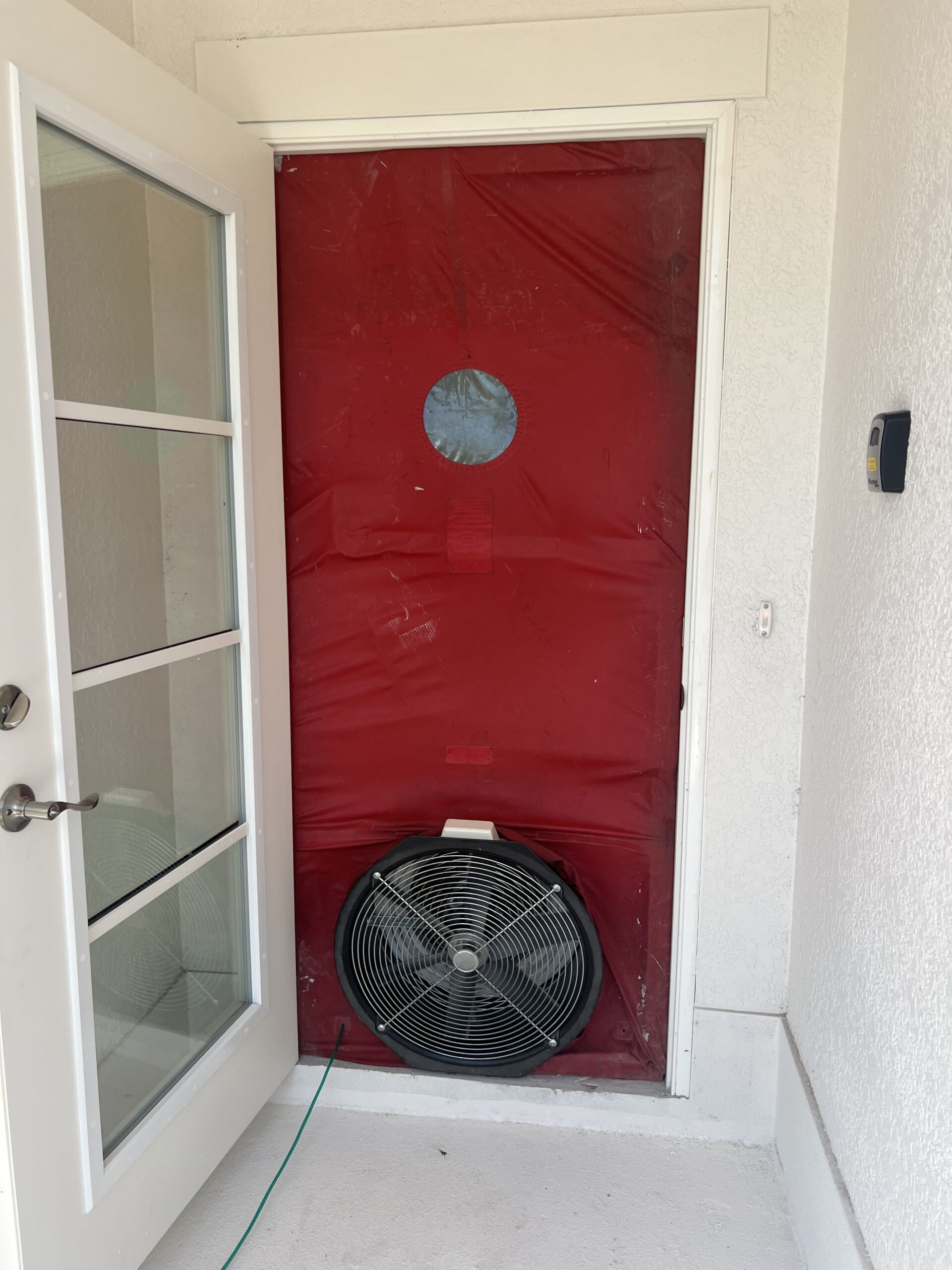Unveiling the Science: The Crucial Role of Blower Door Testing in Elevating Building Performance in Florida
When it comes to building or renovating homes in the Sunshine State, ensuring energy efficiency is not just a matter of comfort; it’s a key element of responsible construction. One often overlooked but vital tool in achieving optimal building performance is blower door testing. In this blog post, we’ll delve into the science behind blower door testing, its significance in the context of Florida’s building code, and how it impacts the permitting process for homeowners and contractors alike.
By: Christine Lam
The Science Behind Blower Door Testing
At its core, blower door testing is a diagnostic tool used to measure the airtightness of a building. It involves fitting a powerful fan into an exterior door opening, depressurizing or pressurizing the building, and then measuring the airflow through any unintentional gaps or leaks. These air leaks in buildings, often found around windows, doors, and other penetrations, contribute to energy loss, making the building less energy-efficient.
For Florida homeowners and contractors, understanding the science behind blower door testing is crucial. The state’s warm climate demands efficient cooling systems, and an airtight building envelope is fundamental to achieving optimal energy performance. By identifying and sealing these leaks, blower door testing helps prevent conditioned air from escaping, reducing the workload on HVAC systems and subsequently cutting energy costs.

Relation to Florida’s Building Code
Florida’s building code, designed to ensure the safety and efficiency of structures in the state, includes specific provisions related to energy conservation. Blower door testing is recognized as a valuable tool for verifying compliance with these energy efficiency standards.
One critical aspect of Florida’s building code is the requirement for a certain level of airtightness in newly constructed or substantially renovated homes. Blower door testing provides a quantifiable measure of a building’s air leakage, helping homeowners and contractors assess whether their projects meet the stipulated standards.
The Florida Energy Conservation Code (FECC), which adopts the International Energy Conservation Code (IECC) standards, emphasizes the importance of blower door testing. Florida building code compliance is not only a legal requirement but also a pathway to creating more sustainable and energy-efficient homes.
What it Means for Permitting in Florida
In Florida, obtaining building permits is a crucial step in the construction process. Blower door testing has become an integral component of the permitting process, and compliance with energy efficiency standards is often a prerequisite for permit approval.
When homeowners and contractors submit their building plans for approval, they must demonstrate compliance with the FECC. The Florida Energy Efficiency Code for building construction requires all new commercial and residential construction (both additions and homes) to have a blower door test for air changes per hour (ACH). The ACH result must fall between 3 and 7 to pass. Essentially, passing the blower door test becomes a certification of a building’s energy efficiency, enhancing its overall performance.
Furthermore, building departments in Florida recognize the long-term benefits of blower door testing in reducing energy consumption. Some municipalities may even offer incentives or fast-track permitting for projects that demonstrate exceptional energy efficiency, encouraging a culture of sustainable construction practices.
Benefits for Homeowners
For Florida homeowners, the benefits of blower door testing extend beyond regulatory compliance. Understanding the airtightness of your home allows you to take proactive measures to improve energy efficiency, reduce utility bills, and enhance overall comfort.
Identifying and sealing air leaks through blower door testing can lead to improved indoor air quality by preventing the infiltration of outdoor pollutants. It also contributes to the longevity of HVAC systems by reducing their workload, resulting in lower maintenance costs over time.
In a state where cooling costs can skyrocket during the scorching summer months, investing in blower door testing during the construction or renovation process is an investment in long-term savings and environmental responsibility.
Blower Door Testing in Florida
In the realm of Florida construction, blower door testing emerges as a crucial tool for homeowners and contractors alike. It not only ensures compliance with the state’s building code but also empowers individuals to create energy-efficient homes that stand the test of time.
Understanding the science behind blower door testing, its relation to Florida’s building code, and the implications for the permitting process equips homeowners and contractors with the knowledge needed to make informed decisions. By prioritizing energy efficiency through blower door testing, we contribute not only to our immediate comfort but also to the sustainability of our homes and the environment for years to come.
Check out related topics….

Air Distribution Basics and Duct Design
Mastering Comfort: Air Distribution Basics and Duct Design for Florida Homes In the world of construction and home improvement, achieving optimal comfort goes beyond aesthetics; it's about understanding the fundamentals of air distribution and duct design....

What is a Good HERS Rating for Homes?
What is a Good HERS Rating? A Guide for Florida Homeowners As a Florida homeowner, you're likely concerned about energy efficiency and the environmental impact of your home. One way to measure a home's energy efficiency is through the Home Energy Rating System...

Maximizing Energy Efficiency with Duct Leakage Testing
How to Maximize Energy Efficiency with Duct Leakage Testing: A Guide for Homeowners In the sunshine state of Florida, where warm weather prevails for most of the year, maintaining a comfortable living environment is essential. Maximizing energy efficiency is not...

Do I Really Need a Manual J Load Calculation?
The Importance of Manual J Load Calculations for Florida Builders, Contractors, and Residents By: Christine Lam July 20, 2023 Florida's climate is known for its hot and humid weather, making it essential for builders, contractors, and residents to prioritize...

